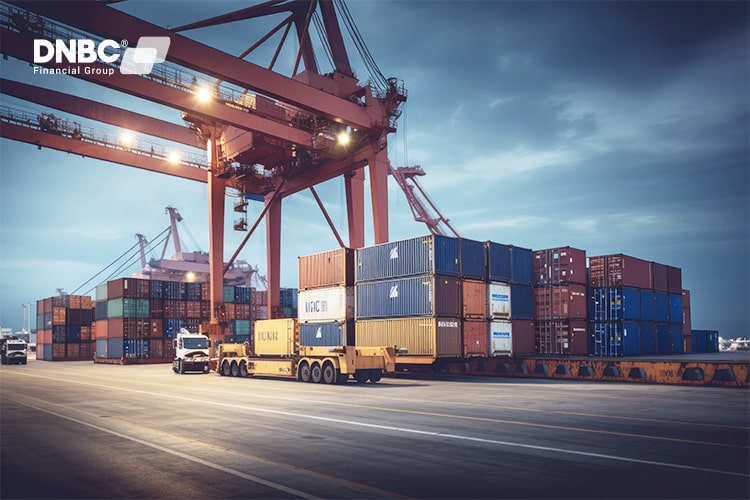In the world of logistics, every decision has a ripple effect, particularly on a company’s financial health. Whether choosing a carrier, negotiating cross-border payments, or evaluating transfer logistics, logistics choices directly impact business financial management. Seemingly minor decisions can lead to unexpected costs that affect overall financial performance. This blog post explores the financial consequences of logistics decisions, the role of international money transfers, and how financial services, like DNBC, can help businesses optimize their logistics processes.
The Financial Impact of Logistics Decisions
1. Hidden Costs in Logistics Choices
Logistics decisions often come down to cost, but choosing the cheapest option is not always the smartest financial move. Opting for a cheaper carrier may seem like an obvious way to save money, but such choices can lead to unforeseen expenses. For instance, carriers that are inexpensive may also have a higher incidence of delays, damages, or lack of reliability. These issues can quickly add up, increasing costs through customer dissatisfaction, claims processing, and lost sales opportunities.
The key to effective Business Financial Management lies in anticipating these hidden costs. Logistics decisions must be made by analyzing both upfront expenses and the long-term impact on Financial Operations. For example, delayed deliveries can affect a business’s cash flow, reputation, and potential revenue, ultimately harming financial stability.
2. Case Study: Logistics Decision Gone Wrong
Consider the following scenario: a business decides to cut costs by partnering with a less expensive carrier for international shipments. At first glance, the decision appears to save the company thousands of dollars. However, repeated delays and a lack of reliable tracking lead to disgruntled customers, canceled orders, and increased return rates. In the end, the company spends more on compensating customers, issuing refunds, and attempting to rebuild its damaged reputation. This example highlights how a seemingly simple logistics decision can create cascading effects on international financial management.

Role of International Money Transfer in Logistics
1.Understanding International Transfer Logistics
Logistics management often involves cross-border operations, requiring businesses to engage in international money transfers. These transactions are crucial for paying overseas suppliers, covering import duties, and ensuring timely shipments. Transfer logistics describes the flow of both goods and payments—and when it comes to international shipping, smooth money transfers are essential for efficient operations.
Managing international transfer logistics effectively contributes to a steady supply chain and stable Financial Operations. Conversely, inefficient money transfers can create costly delays, disrupt operations, and negatively impact cash flow. For businesses engaged in international trade, ensuring timely and cost-effective money transfers is paramount for avoiding financial disruptions.
2. Financial Challenges with Cross-Border Transfers
Cross-border transfers come with a host of financial challenges, including fluctuating exchange rates, high transaction fees, and processing delays. These factors affect a company’s cash flow and financial planning. Imagine needing to pay an overseas supplier within a tight deadline, but facing a delay due to complications in international transfer logistics. These disruptions can put a business at risk of losing critical supplier relationships and, subsequently, its competitive edge.
Such challenges underscore the importance of efficient Business Financial Management. Handling the complexities of international Financial Operations requires reliable financial partners and services to mitigate risks and enhance efficiency.

Financial Services and Their Role in Optimizing Logistics
1. Importance of Financial Solutions for Business Logistics
To navigate these complexities, financial solutions play a vital role in supporting logistics management. Financial services like DNBC provide specialized support to businesses handling international money transfers. These services help streamline transfers, minimize costs, and reduce delays, ensuring efficient cash flow.
Using a trusted financial service provider like DNBC means businesses can have better control over their international transfers and focus on core logistics functions without worrying about transfer logistics complications. This can be instrumental in optimizing logistics decisions, reducing stress, and improving overall financial performance.
2. How Financial Services Can Boost Financial Performance
Financial service providers can mitigate the risks associated with international Financial Operations. For example, using low transaction fees, competitive exchange rates, and fast processing times, financial service companies like DNBC help reduce costs related to international transactions. These financial tools also help logistics managers maintain a positive balance sheet, ultimately contributing to a company’s growth and profitability.
By partnering with reliable financial service providers, businesses can minimize costs, improve cash flow, and make informed logistics decisions, leading to better overall financial health.

Key Considerations for Making Sound Logistics Decisions
1. Balancing Cost with Quality
Businesses often focus on cutting costs without considering the long-term financial impacts. The key to effective logistics management is balancing cost with quality—it’s about making decisions that enhance the value of logistics services, not simply choosing the cheapest available option. For example, investing in a reputable carrier with reliable services can save money in the long term by reducing delays, minimizing claims, and improving customer satisfaction.
Analyzing the Financial Operations aspect of each logistics decision ensures the chosen solution aligns with the business’s financial goals. A holistic approach that balances cost, quality, and financial considerations is the best way to enhance financial outcomes and improve logistics.
2. Leveraging Financial Services for Better Decision-Making
Financial partners like DNBC can help businesses make better logistics decisions by providing customized financial solutions for international Financial Operations. This can include services like hedging to protect against currency fluctuations or offering low-cost transfer options to improve cash flow. Proper financial planning and choosing the right partners can lead to improved logistics efficiency and better financial performance.

Conclusion
Logistics decisions go far beyond choosing a shipping carrier. They have a direct impact on a company’s financial stability and growth potential. Whether considering cross-border payments, choosing carriers, or evaluating overall logistics strategy, businesses must think beyond immediate costs to avoid hidden expenses that affect long-term financial performance.
Leveraging financial partners like DNBC can help mitigate risks, optimize international transfer logistics, and improve cash flow, making logistics decisions that much more beneficial for the company. Evaluating your logistics and financial strategies today can save costs and position your business for long-term success.
DNBC Financial Group is your trusted provider in international money transfer
- Get 100% free 1-on-1 support
- 100% free account opening
- Seamless onboarding process
Or please contact DNBC
![]() Email: [email protected]
Email: [email protected]
![]() Phone Number:
Phone Number:
- +65 6572 8885 (Office)
- +1 604 227 7007 (Hotline Canada)
- +65 8442 3474 (WhatsApp)



 DNBC Team
DNBC Team






